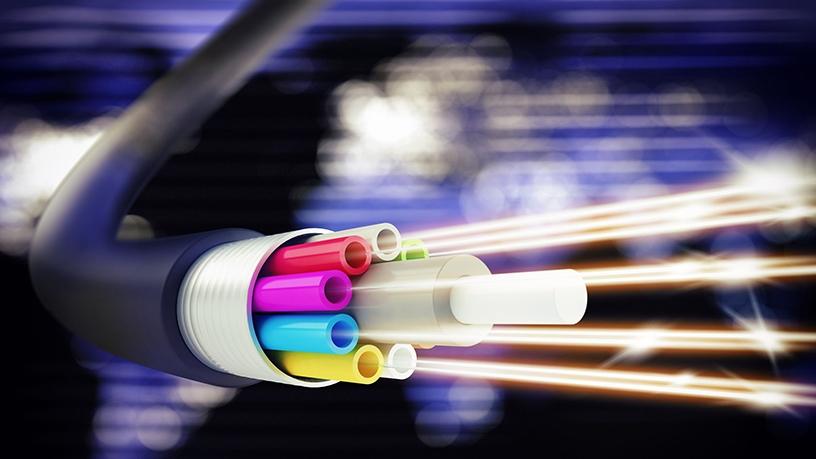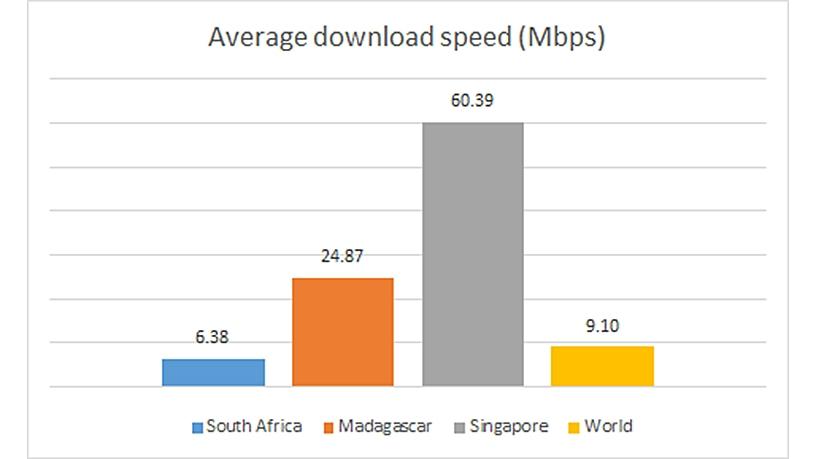
South Africa has moved up four places on the worldwide broadband speed league.
According to Cable.co.uk, SA is now ranked at number 76 out of 200 countries in regards to the average global broadband speed. Last year, the country was number 80.
The report, "Worldwide broadband speed league 2018" is based on over 163 million speed tests in 200 countries.
According to the report, SA has a mean download speed of 6.38Mbps and the time it takes to download a typical 5Gb high-definition movie in the country is 1hr 47min 3sec.
The average global broadband speed measured during the period from 11 May 2016 to 10 May 2017 was 7.40Mbps, and the average global broadband speed measured during the period from 30 May 2017 to 29 May 2018 was 9.10Mbps, a rise of 23%, says Cable.
"With average broadband speeds rising by 23% in just one year, it would be easy to assume an overall positive global picture. However, a closer look reveals the acceleration is concentrated towards the top end: the faster countries are improving more quickly, with those towards the bottom end of the table verging on stagnation," says Dan Howdle, consumer telecoms analyst at Cable.
He points out that Europe, the US and thriving economic centres in the Asia-Pacific region (Singapore, Japan, Taiwan and Hong Kong) are leading the world when it comes to the provision of fast, reliable broadband, which suggests a relationship between available bandwidth and economic health.
"Those countries leading the world should be congratulated, but we should also be conscious of those that are being left further and further behind," says Howdle.
Africa lags

Singapore leads the rankings with a mean download speed of 60.39Mbps and it takes about 11mim 8sec to download a typical 5Gb high-definition movie in that country.
With its vast landmass and little in the way of a digital economy when taken as a continental whole, Cable says Africa is a long way behind the rest of the world when it comes to broadband provision, relying primarily on wireless (WiMAX, 3G, 4G) connectivity rather than cables to cover its vast spaces.
Madagascar is the fastest African nation, clocking in at an average speed of 24.87Mbps, placing it 22nd globally. This is thanks to the underwater EASSy cable that supplies the island's urban centres with respectable fibre broadband speeds.
However, Cable says most other African nations aren't so lucky, with seven out of the 38 included nations having to get by on average speeds of less than 1Mbps.
Commenting specifically on SA, Howdle says: "When it comes to the African continent as a whole, South Africa in particular fares well, coming in third behind only Kenya and Madagascar, the later having an advantage thanks to the EASSy fibre cable running underwater alongside its west coast.
"However, from a global standpoint, South Africa doesn't do so well. The average speed reported here of 6.38Mbps falls below the 10Mbps commonly perceived to be the minimum requirement for an average family household."
Digital divide
Broadband speeds: SA vs the world
- Madagascar is the fastest African nation, with average speed of 24.87Mbps.
- South Africa comes third in Africa, behind Kenya and Madagascar.
- Singapore has the world's fastest average download speed. It take about 11min to download a 5Gb HD movie in Singapore. In SA, it takes close to 2 hours.
- The Scandinavian trio, Sweden, Denmark and Norway, follow Singapore with speeds between 46 and 40Mbps.
- SA's average speed of 6.38Mbps falls below the 10Mbps, commonly perceived to be the minimum requirement for an average family household.
For Arthur Goldstuck, MD of local research firm World Wide Worx, broadband in SA epitomises the digital divide.
"If one can afford it, broadband in South Africa is world-class. A combination of fibre and LTE gives many people a continual high-speed broadband experience. However, that is merely the top of the access pile. Below that, one has ADSL that comes and goes, and is subject to distance from exchange and number of people connected on the same line.
"Then comes 3G mobile broadband; typically outside of the more affluent suburbs and business areas. This can be good or bad depending on density of towers, which is usually a factor of how valuable customers are in a specific area. Finally, we have sub-broadband access, via GPRS, EDGE and the like, where the experience is so poor, it is often unusable.
"We are long past the debate about the benefits of broadband. It is so obviously beneficial across such a wide range of activity, that the only question is how fast we can get quality broadband to the whole population."
Derrick Chikanga, research analyst for telecoms, media and IOT, Africa at IDC, comments that overall, SA broadband speeds compare favourably if not better than other African countries, though the situation differs in rural and urban areas, with better broadband options in urban areas.
"Most households use mobile broadband as it is the most readily available option. With a fibre connectivity rate of around 30%, most households still use legacy copper infrastructure, xDSL which has limited capacity.
"However, the continuous investment in mobile broadband infrastructure and the imminent introduction of 5G technologies, as well as significant investments in fibre infrastructure, is expected to significantly improve both mobile and fixed broadband speeds in South Africa."
Chikanga adds SA is still at developmental stage requiring more investment in broadband infrastructure, especially in townships and rural communities.
"The current ongoing investment and rollout of fibre network across most urban areas can only contribute to improving the situation. However, with mobile broadband being the most common option for many people, further investment and expansion of 4G networks would accelerate improvement of the broadband situation. Further, if more spectrum is made available, it will not only make broadband more ubiquitous but even more affordable."
Share